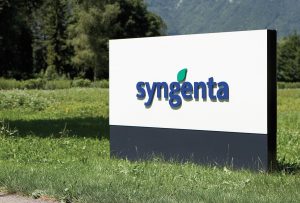 The state-owned China National Chemical Corporation, known as ChemChina, announced Monday that it had received clearance for its $43 billion acquisition of Syngenta (NYSE:SYT) from the Committee on Foreign Investment in the United States. The Committee on Foreign Investment in the United States, made up of representatives from 16 U.S. departments and agencies including the Treasury, Homeland Security and Defense Departments, reviews deals for potential national security issues.
The state-owned China National Chemical Corporation, known as ChemChina, announced Monday that it had received clearance for its $43 billion acquisition of Syngenta (NYSE:SYT) from the Committee on Foreign Investment in the United States. The Committee on Foreign Investment in the United States, made up of representatives from 16 U.S. departments and agencies including the Treasury, Homeland Security and Defense Departments, reviews deals for potential national security issues.
The approval by the regulator removed one of the biggest potential challenges to the deal. U.S. lawmaker Sen. Charles Grassley (R., Iowa) had expressed concern about how the deal would affect U.S. food security. Based in Basel, Switzerland, Syngenta is one of the world’s largest producers of agricultural chemicals, including insecticides, fungicides, herbicides and seeds. Syngenta reported sales of $13.4 billion in 2015. Roughly 27 percent of those sales came from North America.
ChemChina agreed to acquire Syngenta in February. Six months earlier, the company rejected a $47 billion takeover bid by Monsanto, saying that the deal undervalued the business. Monsanto abandoned the acquisition in August. If completed, the acquisition would be China’s biggest foreign deal ever. ChemChina’s advisers, HSBC Holdings and China Citic Bank International have provided financing for the entire $43 billion bid.
The transaction is still subject to antitrust review in several countries. In Europe, regulators are expected to scrutinize the deal’s effects on the crop-protection chemicals industry. If European regulators take issue with the deal, Syngenta and ChemChina may be able to resolve antitrust concerns by selling assets. The companies released a statement saying, “Both companies are working closely with the regulatory agencies involved and discussions remain constructive.”
ChemChina has completed acquisitions of more than a half-dozen companies in Europe, the Middle East and Australia in recent years. Last year, ChemChina bought Italian tire maker Pirelli for about $8 billion at current exchange rates. In January, the Chinese company took a minority stake in Mercuria, a Swiss energy and commodities company. That month, the company also made a deal to buy KraussMaffei, a German machinery manufacturer, for about $1 billion.
